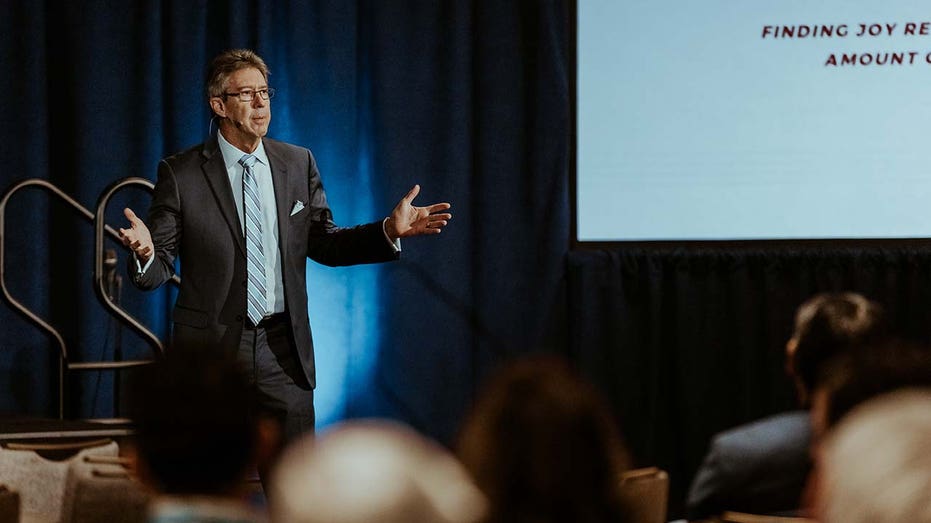Financial expert: Government-fueled inflation is killing retirements
Dr. David Phelps warns investors must prepare for the long haul
Government spending is taxation: Art Laffer
Former Reagan economic adviser Art Laffer slams Democrats’ stimulus spending which is exacerbating the inflation crisis.
Stubborn inflation continues to bring pain as it chips away at consumers' buying power, but the impact could be more far-reaching as the high cost of living upends Americans' plans for their golden years, one expert warns.
Dr. David Phelps argues in his latest book, "Inflation: The Silent Retirement Killer," that decades of unchecked government spending coupled with the actions of the Federal Reserve made today's inflation inevitable, and warns that investors must adjust and prepare for the long haul.

A customer orders food at a butcher shop in Louisville, Kentucky, on Aug. 23, 2022. The cost of food rose 11.4% year-over-year in August. (Luke Sharrett/Bloomberg via Getty Images / Getty Images)
While the Labor Department's latest consumer price index shows the cost of everyday goods rose 8.3% year-over-year in August, Phelps told FOX Business the actual hit to Americans' wallets is likely twice that. What's worse, he says, is that he sees inflation sticking around because with federal spending run amok, there is little the central bank can do to rein it in.
Phelps predicted the inflation surge last fall when he began writing his book, saying he read the tea leaves as the government continued to print trillions of dollars to fight the pandemic with programs like unemployment benefits "on steroids," stimulus payments, and the long-extended pause on student loan payments. But he says the writing was already on the wall that inflation would balloon – COVID spending just accelerated it.
SURPRISINGLY HOT AUGUST INFLATION DATA SOLIDIFIES ODDS OF ANOTHER JUMBO FED RATE HIKE
"Even pre-COVID we had years and years of increasing budget deficits and national debt – it's just been stacking, stacking, stacking," Phelps said. "The government being able to kick the can down the road was going to break."
Still, never-ending "pandemic" perks like student loan forgiveness continues to fuel inflation further, with no end in sight.

Dr. David Phelps
Phelps expects the U.S. economy to be anemic for the next decade or so, which he says changes the picture for many of the people relying entirely on a 401(k), a model which relies on the conventional idea that the economy is always going to grow.
"People thought they were going to have this nest egg that, by financial metrics, would be enough," he says. "So I think the wake-up call is to understand it's not going to be the same. We are in a different time altogether today… they're going to need probably more than they thought they were going to need, which is not good."
Now, he says, people need to protect themselves, and warns that fixed income streams like annuities will not be able to produce the lifestyle needs of people who will depend on them years down the road.
BILLIONAIRE RAY DALIO WARNS STOCKS COULD PLUNGE 20% IF INTEREST RATES RISE TO 4.5%
Phelps is a big believer in investing in tangible assets like real estate or a business, which he says have the best potential to keep pace with inflation. And he has a track record to prove it.
He is a former dentist whose daughter – now a healthy 30-year-old – was blindsided by epilepsy, late stage liver failure, and leukemia when she was only 12. In order to care for her during her health crisis, Phelps sold his practice and invested the proceeds in real estate so that he could support his family with passive income.

Dr. David Phelps (Dr. David Phelps)
Phelps' colleagues from the dental industry soon began asking him how he was making ends meet, and he began offering them tips. Before long, he had so many inquiries he became a formal coach and now runs an investing community called Freedom Founders.
GET FOX BUSINESS ON THE GO BY CLICKING HERE
He says the main question Freedom Founders members have when they join the group is whether they have enough saved to slow down and retire. But as dentists, they tend to have higher incomes than the average American.
"That's the question I think everybody's going to have – whatever your place in the economic lineage is – everybody's going to worry about that," Phelps says. "Social Security's not going to cover it… so the majority of retirees are going to have a tough time."





















